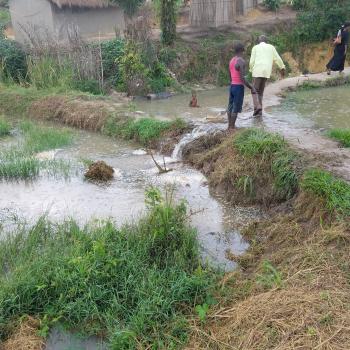
The Tshoper Kabambi story
We drive to the initial application point for all Congolese who wish to go to South Africa. This is our second trip there. We’re trying to get Tshoper’s visa so that he can attend the Durban International Film Festival. Tshoper is in the driver’s seat, as I have promised my husband and myself that I will never drive in Kinshasa.
We stop as traffic comes to a halt. Tshoper tries to steer around the jam, but a police officer shoos him back. Tshoper asks why he can’t get into the other lane, and the officer approaches. Am I the one who motivates the next action—I, with my white skin and obvious Scandinavian heritage? I hear a clatter of metal and shouting, and realize that the policeman has just reached through the open window and into the car. It’s all so quick. I look. There is his hand, reaching for the key. He is going to steal the car key! Tshoper swoops him away with his forearm, but the policeman is fast. Like a duck slapping the water, he fights with Tshoper’s arm and aims for the papers on the dashboard—the ones every person who drives in the Congo must have displayed. More flapping, more shouts. Tshoper has managed to push the man’s hand away and now quickly rolls up the window.
So fast. And I know what was intended. With either result—the loss of the key or the loss of the official paper—we would be forced into the policeman’s power play. We would be the mice to his cat, powerless to move forward unless we paid for the key or for the paper, and the policeman would determine how much. Certainly, my presence would increase the price.
Angrily moving into the other lane, Tshoper says, “That’s what’s happening here. People live only for today. There is no vision for tomorrow.”
Every man for himself, grabbing whatever presents itself. Not much forethought, no sense of morality. Morality can be fatal, can’t it?
But next to me is Tshoper Kabambi, defying every stereotype—including those which the Congolese have for each other. He has already defied the odds and has made award winning films. Equally important, he has produced his friends’ films, which have also won awards. His company, Bimpa Productions, teaches anyone who wants to learn about filmmaking—without cost. Yes, without cost. His vision is one of a future claimed by a united people with a common goal, and who completely support one another. There is no room for bribery or theft in this future world.
How far he has come!
When he first enrolled in the Kinshasa Institute for Arts, aiming to become a filmmaker, there was not really a film program. There was theatre and the promise of some instruction in filmmaking, but no real program. The school owned some books about film, which students could borrow for a time, but no cameras for students to practice with, and not even a way to view films.
Tshoper decided to provide the films himself. Every day, he would carry a television to the school. He traveled on foot and lived about three kilometers from the school. Nonetheless, there he was, coming and going, with a television in his arms. All of the students and the professor worked with the wires from an outlet to power the TV, and then watched whatever static-y film they could find on the various stations. (The films, of course, were all made in Europe or in America.) Afterwards, they would critique the film.

This was Tshoper’s initiation into the world of film. The lack of equipment in the Institute inspired him to establish his own school, his own film festival—for the benefit of all. Even children—from orphanages, from nursery schools, from the streets—would be invited to see films and to experiment with storytelling.
Such was the dream.
He began purchasing the needed equipment, starting with a camera and moving to computers and programs for sound design, editing, and color mastering. He would teach himself how to use all of these programs. Lacking, as of today, are an office (explained in the previous post) and lighting. Also lacking: a cinema.
This morning, we bought a tripod. I say that WE bought the tripod because I consider myself a member of Bimpa Productions, tasked with whatever I can offer, just as the other members are.

We will know on Tuesday whether or not Tshoper’s visa to Durban will come through. If it does, he will be on a flight to the Durban International Film Festival the next day.
If it doesn’t–.
Well, we don’t think that way. We are dreamers, after all.













